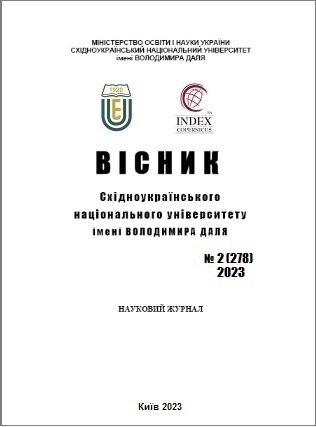Machine learning models for the formation of recommendations
DOI:
https://doi.org/10.33216/1998-7927-2023-278-2-96-105Keywords:
recommendation system, filtering methods, machine learning algorithms, performance evaluationAbstract
The article presents an experimental study of deep neural network models for generating relevant recommendations for each user of Internet resources. A recommender system is a software tool that uses a specific filtering algorithm and available information about the user's needs in order to recommend to him a relevant set of objects that are most useful to him.
An analysis of recent research and publications in the field of introducing recommender systems has shown that improving the quality of recommender system proposals based on machine learning methods is an urgent task. The use of neural networks in recommender systems can improve the efficiency and usability of these systems.
The aim of the study is to improve the quality of recommender system proposals based on machine learning methods.
In the course of the study, a set of stages was systematized and a methodology for building an effective recommender system using machine learning methods was determined. The mechanisms are defined, the stages are formalized, and a technical block diagram for the development of a neural recommender system is presented. Two models of neural network recommender systems are built using joint filtering and deep matrix factorization.
Evaluation of recommendation systems by indicators was carried out Precision, Recall and Normalized Discounted Cumulative Gain.
Research was carried out using such optimization algorithms: SGD, RMSprop, ADAdelta and FTRL. The results of an experimental study of deep neural network models when generating recommendations in various scenarios showed that their performance can vary greatly depending on the search model, the amount and quality of data, as well as the network architecture and network training method.
Based on the results of the experiments, the optimal learning algorithms for the neural network recommender system model were determined for solving a specific problem, depending on the nature of the initial data.
The experimental research was conducted using Python and TensorFlow.
The work uses freely available datasets on movie ratings from the MovieLens website.
References
1. Мелешко Є.В. Дослідження методів побудови рекомендаційних систем в мережі Інтернет / Є.В. Мелешко, Г.С. Семенов, В.Д. Хох. // Збірник наукових праць "Системи управління, навігації та зв’язку". Випуск 1(47). – Полтава: ПНТУ ім. Ю. Кондратюка. – 2018. – С. 131–136.
2. Recommender systems. Algorithms [Електронний ресурс]. Режим доступу: https://www.cs.carleton.edu/cs_comps/0607/recommend/recommender/algorithms.html (дата звернення: 30.07.2023)
3. Покришка С.А., Шумова Л.О. Удосконалення рекомендаційної веборієнтованої системи з ви-користанням колаборативної фільтрації. // Вісник Національного технічного університету «ХПІ». Збірник наукових праць. Серія: Інформатика та моделювання. – Харків : НТУ «ХПІ». – 2021. – № 1 (5). – С. 115 – 123.
4. Zhang, S., Yao, L., Sun, A., Tay, Y. Deep learning based recommender system: A survey and new perspectives. ACM Comput. Surv. (CSUR) 52(1), 2019, рр. 1-38.
5. He, X., Liao, L., Zhang, H., Nie, L., Hu, X., Chua, T.S. Neural collaborative filtering. In Proceedings of the 26th International Conference on World Wide Web, Perth, Australia, 3–7 April 2017; pp. 173–182.
6. Vasileios Perifanis, Pavlos S. Efraimidis. Federated Neural Collaborative Filtering, Knowledge-Based Systems, Volume 242, 2022, 108441, ISSN 950-7051, https://doi.org/10.1016/j.knosys.2022.108441.
7. Tian Y., Peng S., Zhang X., Rodemann T., Tan K., Jin Y. A Recommender System for Metaheuristic Algorithms for Continuous Optimization Based on Deep Recurrent Neural Networks. IEEE Transac-tions on Artificial Intelligence, vol. 1, № 1, pp. 5-18, Aug. 2020, doi: 10.1109/TAI.2020.3022339.
8. Melville P., Sindhwani V. Recommender Systems, Encyclopedia of Machine Learning, Claude Sammut and Geoffrey Webb (Eds), Springer, 2010.
9. https://grouplens.org/datasets/movielens/
10. Statistical Analysis of K-Nearest Neighbor Colla-borative Recommendation URL: https://arxiv.org/pdf/1010.0499.pdf (Last accessed: 20.04.2023).
11. Isinkaye F. O. Recommendation systems: Principles, methods and evaluation / F. O. Isinkaye, Y. O. Fola-jimi, 75 B. A. Ojokoh // Egyptian Informatics Jour-nal. – Vol. 16. – 2015. – P.261–273.
12. Tegene A., Liu Q., Gan Y., Dai T., Leka H., Ayenew M. Deep Learning and Embedding Based Latent Factor Model for Collaborative Recommender Systems. Appl. Sci. 2023, 13, 726. https://doi.org/ 10.3390/app13020726
13. Xiaoyu Du et al. Deep Matrix Factorization Models for Recommender Systems. URL:https://www.ijcai.org/proceedings/2017/0447.pdf(Last accessed: 20.04.2023)
14. Yamashita A., Kawamura H., Suzuki K. Similarity Computation Method for Collaborative Filtering Based on Optimization // Journal of Advanced Computational Intelligence and Intelligent Informatics, 2010. Vol. 14. №6. P. 654–660.
15. Cimini G., Medo M., Zhou T., Wei D., Zhang Y.-C. Heterogeneity, quality, and reputation in an adaptive recommendation model // The European Physical Journal B. 2011. Vol. 80. № 2. P. 201–208.
16. Ruder S. An overview of gradient descent optimiza-tion algorithms (2017) https://arxiv.org/abs/1609.04747 = https://www.ruder.io/optimizing-gradient-descent/
17. Ioffe S., Szegedy C. Batch normalization: accelerat-ing deep network training by reducing internal cova-riate shift (2015) https://arxiv.org/abs/1502.03167
18. Hinton G. Overview of mini-batch gradient descent (2012) https://www.cs.toronto.edu/~tijmen/csc321/slides/lecture_slides_lec6.pdf
19. Shani G., Gunawardana A. Evaluating recommender systems, in Recommender Systems Handbook, ed. by F. Ricci, L. Rokach, B. Shapira, P. Kantor (Springer, Berlin, 2011), pp. 257–297.
20. Murrell T. Evaluating Recommendation Systems - Precision@k, Recall@k, and R-Precision (2023) https://www.shaped.ai/blog/evaluating-recommendation-systems-part-1
21. Murrell T. Evaluating recommendation systems - (mAP, MMR, NDCG) https://www.shaped.ai/blog/evaluating-recommendation-systems-map-mmr-ndcg
22. He X., et al. Deep Factorization Machines for Re-commender Systems. IEEE Transactions on Know-ledge and Data Engineering, 2017.

